Theirs Is A Light That Will Never Go Out
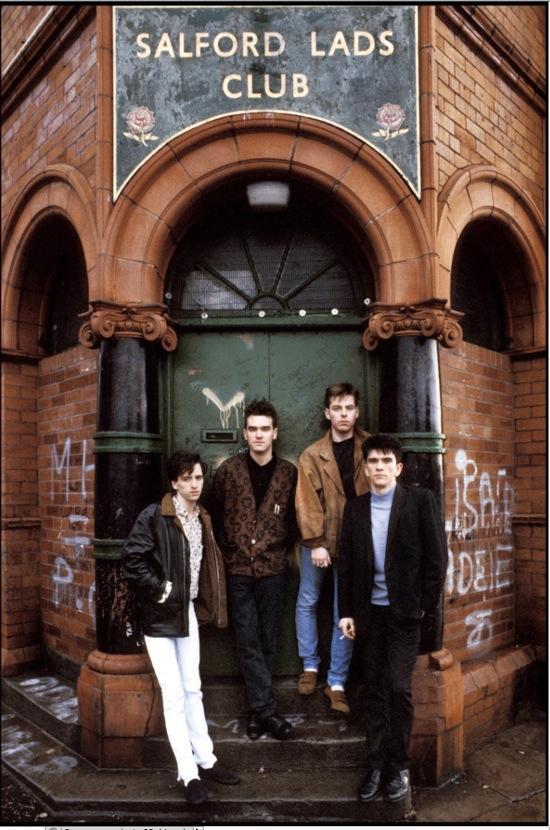
Steven Patrick Morrissey, Johnny Marr, Andy Rourke and Mike Joyce. Affectionately known to you and me as The Smiths.
Now here comes the controversial bit, above is a fact. Those are the four members and they were in a band called The Smiths, now I also believe that there were in the most important British band ever!
Why do I think this? Well carry on reading and I will tell you!
These Charming Men
Songwriting partnerships were not a new thing when The Smiths came into existence John Lennon & Paul McCartney had been writing songs together 20 years previously, but there was something different with Morrissey & Marr.
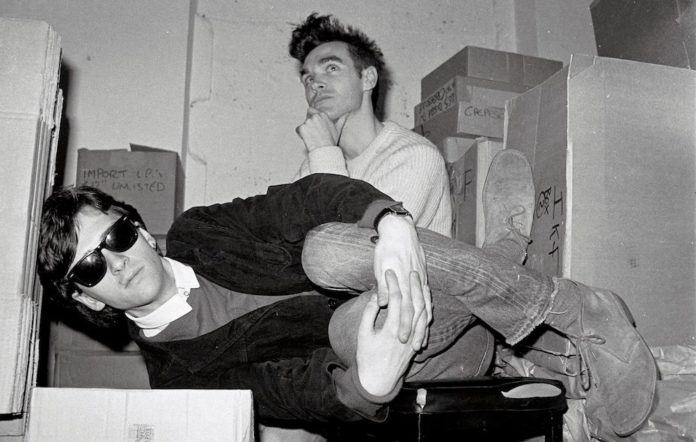
The story of how Johnny Marr and Morrissey met is almost mythical, an origin tale that has become the stuff of musical legend. Johnny Marr had been in bands since he was a child and, by the time he was 18, he seemed to know every musician in Manchester. He had already established himself as a brilliant guitarist and wanted to form his own band, one that would capture the energy of the city while offering something new. Meanwhile, Morrissey was 23, a more reclusive and introspective character, but his talent as a writer had already caught the attention of those around him.
One afternoon in May of 1982, Marr, eager to meet Morrissey, knocked on the door of 384 Kings Road, Stretford, Manchester. Morrissey invited him inside, and the two sat down to listen to music, talking endlessly about pop culture and their shared musical tastes. Though they seemed so different in character, their discussions revealed that they had strikingly similar views on what music should be an outlet for rebellion, individuality, and expression. This meeting was the spark that ignited one of Britain’s most important and prolific songwriting partnerships.
From the start, the two seemed to complement each other perfectly. Morrissey, a keen writer and voracious reader, would take charge of the lyrics, his distinctive voice shaping the songs with stories of alienation, introspection, and longing. And let’s face it — he wrote some of the most iconic lyrics in rock history. His words were sharp, witty, and emotionally charged, often creating vivid, dark, and poignant imagery.
“I decree today that life is simply taking and not giving / England is mine — and it owes me a living.” (Still Ill, 1984)
"Good times for a change / See the luck I’ve had can make a good man turn bad." (Please Please Please Let Me Get What I Want, 1984)
"Belligerent ghouls run Manchester schools" (The Headmaster Ritual, 1985)
These are just a few of the lyrics that showcase Morrissey’s brilliant way with words, but there are countless more, each one a testament to his unique voice as a writer. He may just be the most literate man ever to write lyrics, capturing not only his own inner turmoil but also the struggles and frustrations of an entire generation.
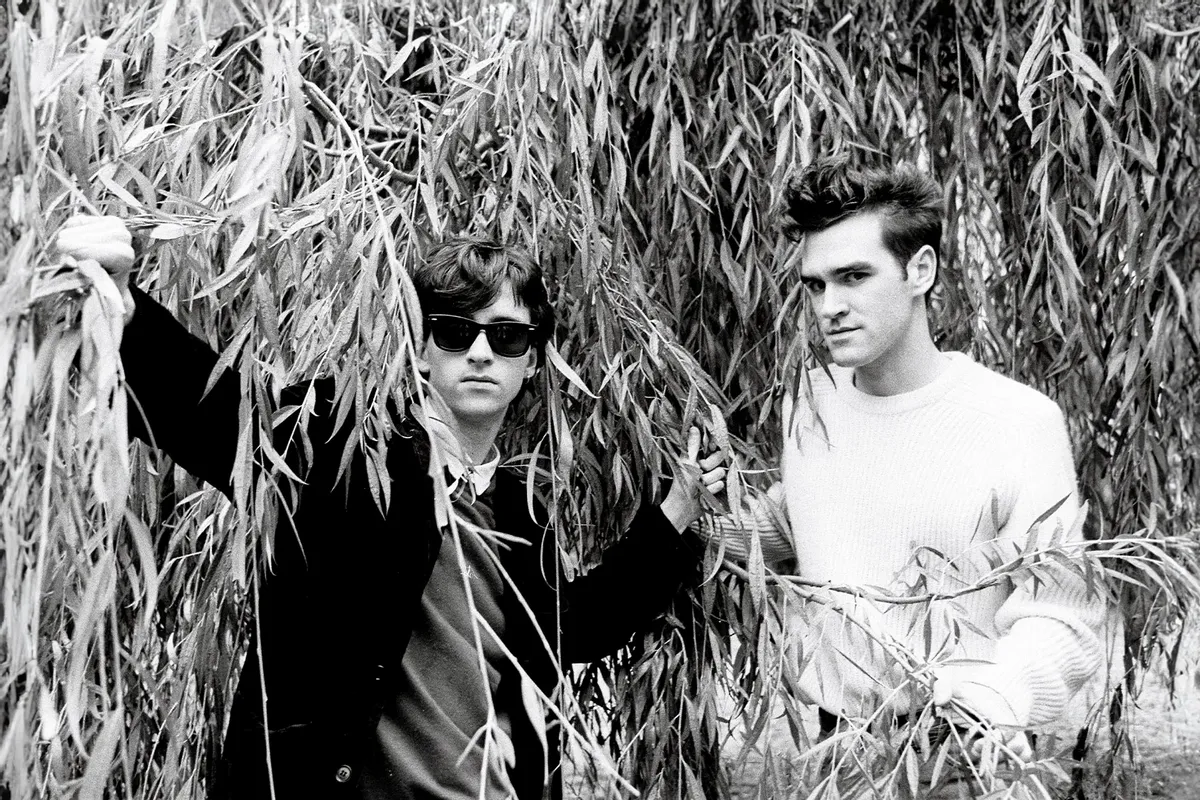
Marr, on the other hand, was the musical mastermind behind it all. The word "genius" gets thrown around a lot, but in the case of Johnny Marr, it’s a title that is more than deserved. He is one of the best guitarists ever, his signature riffs becoming instantly recognizable and etched into the musical landscape. But what makes Marr so special is not just his technical skill it’s his ability to craft intricate, beautiful guitar lines that enhance the emotional depth of the songs without ever overshadowing them. His riffs, chords, and melodies serve the song, always with a keen sense of subtlety and grace. Every note is considered, every chord has its place, and the result is a body of work that still feels timeless.
Johnny’s talents went beyond just the guitar, however. He was also a skilled harmonica player, a contribution that became one of the defining sounds of The Smiths. The harmonica, often paired with his jangly guitar, became a hallmark of the band’s early work, especially on their debut single 'Hand in Glove'. While Morrissey’s domain was the brilliant lyrics, Marr’s was the music, and their partnership allowed both of them to flourish.
Perhaps one of the clearest examples of their symbiotic relationship is 'How Soon Is Now?', a track that still sounds ahead of its time. The opening, with its haunting, cascading guitar and atmospheric buildup, is one of the most iconic moments in rock music, sending shivers down the spine of anyone who hears it. It’s a perfect blend of Marr’s intricate guitar work and Morrissey’s emotionally charged lyrics. The song's mood shifts seamlessly from melancholy to defiance, and its influence can be heard across multiple genres today.
Both Marr and Morrissey knew how to play to each other’s strengths, and that’s why The Smiths’ catalog of songs has endured for so long. Their music is fresh and contemporary, despite its age, because they created something that transcended their time. What they left behind isn’t just a collection of songs; it’s a snapshot of a generation's emotional and cultural struggles, wrapped up in melodies that have never lost their power. The genius of their partnership lies in the balance between Marr’s musical brilliance and Morrissey’s lyrical mastery both working in harmony to create a sound that was completely unique, yet universally relatable
The Other Fab Four
It is sometimes easy to forget there were 4 members in The Smiths. Of course, Morrissey and Marr are often considered the frontmen and geniuses, but Andy Rourke and Mike Joyce were integral to the band’s success and their place in musical history. They were four totally different individuals who came together to create something both musically and culturally significant. Johnny Marr put it best when he said, 'We were a bunch of strangers to all intents and purposes – who then became incredible friends… we came together to make that music.'
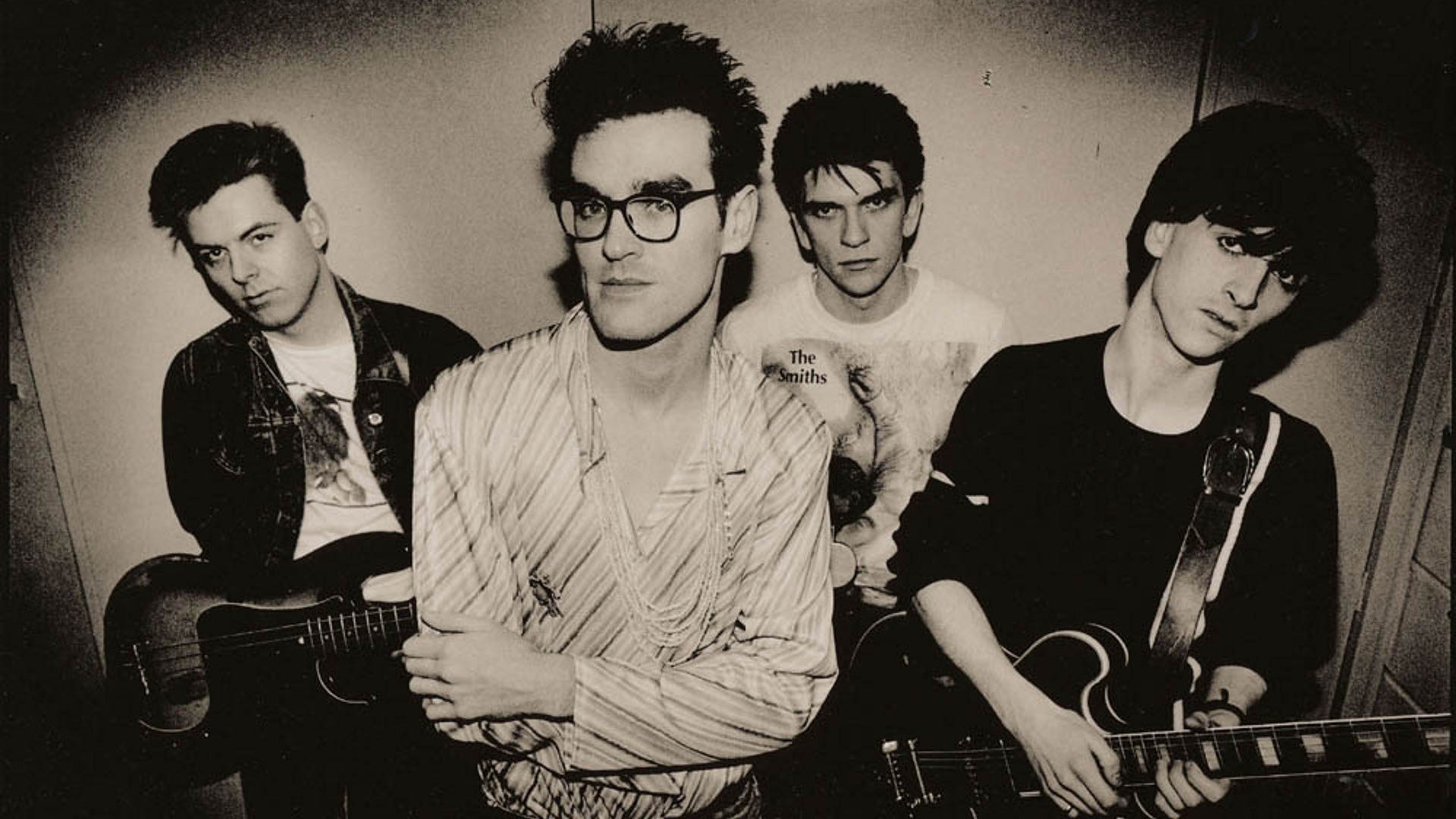
Both Rourke and Joyce were brilliant musicians in their own right — they could play, and they played with precision and creativity. Joyce, although he had cut his teeth in the Manchester punk scene, was far more than just a drummer with style. His drumming became an essential part of The Smiths' signature sound, providing a rhythmic foundation that knitted the songs together. Whether it was a dark, brooding beat or a more pop-oriented groove, Joyce's drumming provided the perfect backdrop to Marr’s jangly guitars and Morrissey’s distinct vocals. His ability to adapt to the mood of each song, while maintaining a driving force, is often overlooked but essential to their success. His fills, timing, and choice of patterns allowed the band to explore different sonic landscapes, and this versatility was one of the defining features of The Smiths' sound.
Andy Rourke, too, had been around the Manchester scene before The Smiths and had played in bands with Marr prior to joining the band. The chemistry between the two was undeniable, and Rourke’s bass playing became one of the most distinctive elements of The Smiths' music. He quickly blossomed into one of the best bass players of his era, and his bass lines became some of the most recognizable in musical history. His approach was unlike many other bass players at the time; rather than simply providing a rhythmic backbone, Rourke’s bass often played melodies, weaving in and out of the guitar lines, creating a complex, yet harmonious relationship between the two instruments.
The reason for this unique style? Well, I'll let the man himself explain. “I tried to do a tune within a tune,” Rourke told Bass Player in 2006. “I wouldn’t be happy with a bassline unless you could hum it.” His commitment to making his bass lines memorable and melodic is one of the reasons why they remain so iconic to this day. He wasn’t just a bass player; he was a musical architect, often taking the lead in creating the song’s emotional and tonal atmosphere. His work on tracks like 'This Charming Man,' 'How Soon Is Now?' and 'Bigmouth Strikes Again' shows just how crucial his bass lines were in elevating The Smiths' sound from great to iconic.
Together, the four of them formed an extraordinary musical unit. Each brought their own unique set of skills, influences, and perspectives, and their differences created a synergy that would lead to a collection of songs that still resonate today. While Marr and Morrissey may have been the faces of the band, it’s essential not to forget the critical contributions of Rourke and Joyce without them, The Smiths simply wouldn’t have been The Smiths.
Louder than Bombs
The Smiths became such a creative force in the short amount of time they were together, it seems that they were never out of their purple patch.

As well as a run of legendary singles, four brilliant studio albums. The band released an astonishing selection of bonus material and b-sides. Songs like These Things Take Time, Half a Person, Shoplifters of the World Unite, Stretch Out and Wait, and even How Soon is Now were tucked away as b-sides and bonus tracks. Albums like Hatful of Hollow, Louder Than Bombs and The World Won't Listen, are just as important as the studio albums because they have these hidden gems on.
In a decade filled with synthesiers, airbrushed mainstream pop acts, and mad haircuts. The Smiths offered something different and did things on their own terms. They became the first indie band to transcend, hitting the number one spot with 'Meat is Murder' they made the path for others to follow. They forged a path for generations of musicians, and still make kids pick up guitars, they lead introverts to the dancefloor. They turned melancholy and pain into indie anthems. These songs are dark, beautiful and sometimes haunting affairs. Yet they are full of soul, humor and a lot of irony. Morrissey could be really really funny, when he wasn't bearing out his soul.
Oh Manchester, So Much to Answer for.....
The Smiths are from Manchester, and they couldn't have been from anywhere else. Manchester is echoed in The Smiths lyrics and the music, you can here the cities industrial nature in the songs, Morrissey sings about a bleak urban England of the past. He was writing about what he had seen and continued to see, some of the lyrics in songs, in 2013 Morrissey said this about Manchester ‘a place where everything remains where it was left 100 years ago’. The band made so subtle nods to the city and some more obvious ones, (the named an album after the cities prison, Strangeways Here we Come) it's a huge part of the bands sound and lyrics.
It's a city that has produced so many great bands both before and after The Smiths, a city with music at it's very core. Would London, Birmingham, Glasgow, Dublin or Cardiff have allowed Johnny Marr to knock on Morrissey's door in 1982 I'm not sure they would.
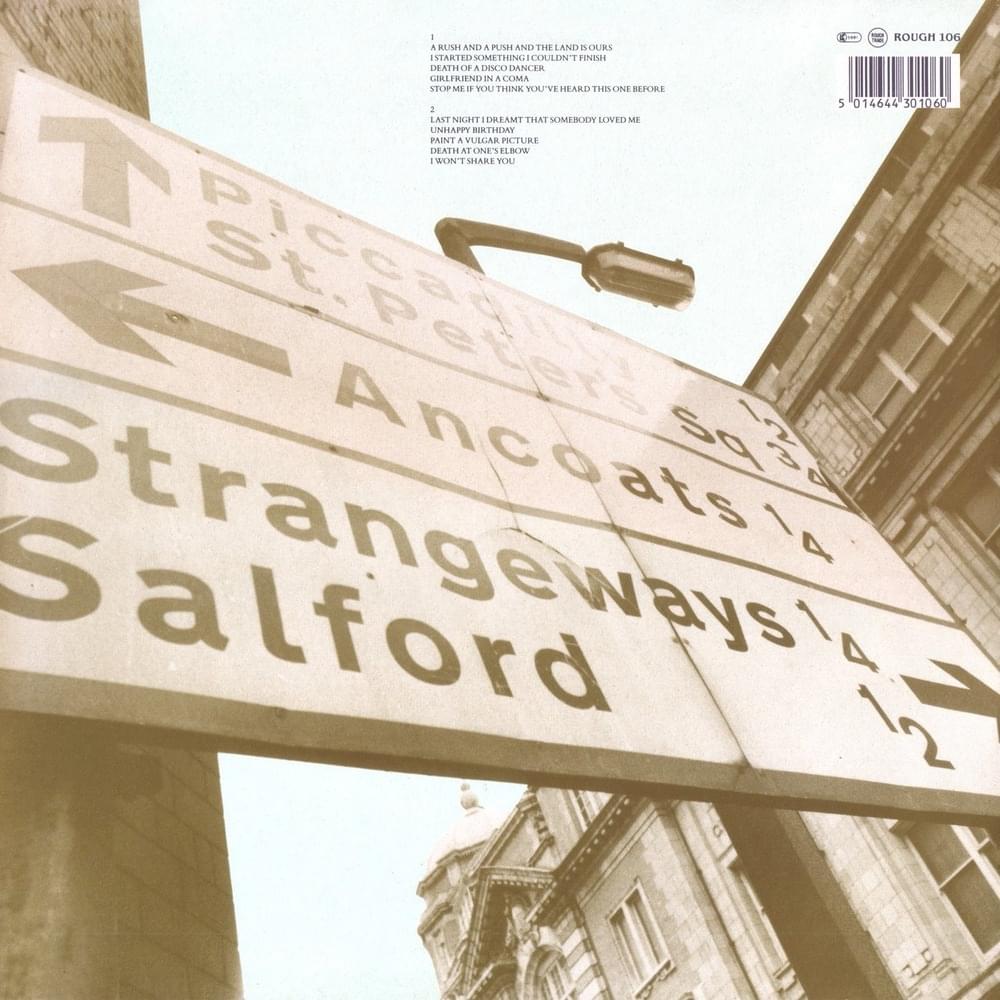
I Started Something I Couldn't Finish
The Smiths formed in May 1982 and broke up in June 1987 a mere 5 years. Now, people often claim The Beatles’ career was short-lived, yet they were together for 10 years. Five years, in comparison, seems like nothing. But it’s all relative. It took The Stone Roses 5 years to write and record their second album, and the gap between the Arctic Monkeys’ 'AM' and their follow-up, 'Tranquility Base Hotel & Casino'? You guessed it, 5 years.
Yet, in those 5 years, The Smiths achieved what most bands could only dream of in a much longer career. They released 4 iconic studio albums: 'The Smiths', 'Meat Is Murder', 'The Queen Is Dead', and 'Strangeways, Here We Come'. Alongside these, they released 18 singles that remain some of the most influential in modern music. These tracks, in my opinion, rival any band's catalogue, including The Beatles’. Yes, even The Beatles! Just look at the sheer brilliance and diversity of the singles.
'Hand in Glove', 'This Charming Man', 'What Difference Does It Make?', 'Heaven Knows I'm Miserable Now', 'William, It Was Really Nothing', 'How Soon Is Now?', 'Shakespeare's Sister', 'That Joke Isn't Funny Anymore', 'The Boy with the Thorn in His Side', 'Bigmouth Strikes Again', 'Panic', 'Ask', 'Shoplifters of the World Unite', 'Sheila Take a Bow', 'Girlfriend in a Coma', 'I Started Something I Couldn't Finish', 'Last Night I Dreamt That Somebody Loved Me', 'There Is a Light That Never Goes Out'.
Quite the run, isn’t it? These songs aren’t just memorable; they’re milestones in the history of music. The Smiths’ singles captured the essence of youth, longing, and disillusionment, with both a sharp bite and a tender heart. They brought emotional depth and complexity to pop music, and their impact can still be felt today. Alongside these 18 singles, the band also released compilations such as 'Hatful of Hollow', 'Louder Than Bombs', and 'The World Won’t Listen' collections of B-sides, rare tracks, and live performances that are just as important as the studio albums. These compilations hold key gems that every fan treasures, songs that, to this day, cannot be found anywhere else, making them essential pieces of the band's musical legacy.
And it’s important to remember that The Smiths broke up at their peak. Their last studio album, 'Strangeways Here We Come', is regarded by all four members as their best, and it’s also the one they enjoyed making the most. It marked a period of musical maturity and creative expansion, with more layered production and intricate arrangements. It was an album that proved they were still evolving as artists, showcasing the depth of their collaboration and their ability to push musical boundaries.
Imagine what could have been if they had continued to make music together the potential for even more groundbreaking records, songs that would have defined the next decade.
However, the magic of The Smiths lies in the fact that they didn’t overstay their welcome. They left behind a body of work that is concise, impactful, and eternally relevant. Their influence has been felt across generations, from the Britpop era all the way through to modern indie rock. The Smiths did more in 5 years than many bands manage in a lifetime. And that, in itself, is something extraordinary."
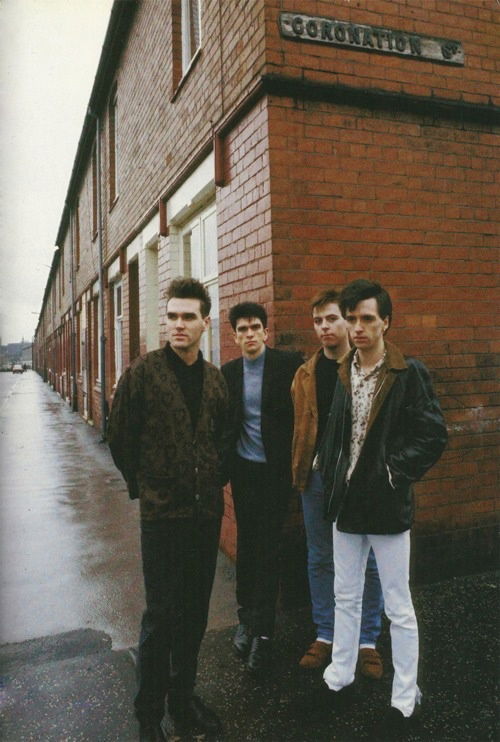
The legacy of The Smiths cannot be overlooked, and although all 4 members have continued to make music, from Morrissey's solo career, to Marr's collaborations and super groups. It is The Smiths they will be remembered for the most. Their sound echoes around Manchester, The Stone Roses and Oasis were greatly influenced by Morrissey's portrayal of and nostalgia for a bleak urban England of the past." Even more recent acts like Courteeners and Blossoms can thank The Smiths.
"Britpop was a huge musical phenomenon in the UK, and The Smiths were a monumental influence for all three main players in that movement. Blur, for example, formed as a direct result of seeing The Smiths on The South Bank Show in 1987. Noel Gallagher from Oasis has stated on multiple occasions that The Smiths are one of his biggest influences, and it’s clear to see how much Morrissey’s sharp lyricism and distinctive presence shaped his songwriting and attitude. The Smiths, and more specifically Morrissey, had a profound effect on Pulp as well.
The band's wit, dark humor, and tales of the mundane often with an underlying sense of melancholy are unmistakably reminiscent of Morrissey's storytelling. These traits can be heard echoing in Arctic Monkeys’ early records, where the narrative style and sharp observations on life, love, and working-class realities all bear the mark of The Smiths’ influence.
Their influence doesn’t stop there. It’s woven throughout the very fabric of British music culture, rippling through the Stone Roses, Oasis, and The Libertines, reaching all the way to today’s crop of young guitar bands. Whether it’s the introspective lyrics, the guitar-driven sound, or the sense of disillusionment and rebellion, The Smiths’ legacy is everywhere. You can trace the roots of modern indie and alternative rock directly back to the ethos and style that The Smiths pioneered from their evocative songwriting to the way they redefined what it meant to be a band in the post-punk era. The ripple effect is undeniable, making The Smiths not just an iconic band, but a cornerstone of the UK’s musical heritage that still inspires new generations of musicians and fans today
I will end this post with a quote from the bands first manager
“They wrote some truly great songs,” The Smiths’ first manager, Joe Moss, told the BBC in 2013. “The songs were fantastic musically and great lyrically, and that’s a tricky thing to get right. It’s like a James Dean thing, the legend has remained intact ever since. They didn’t get to the point where they were making albums that nobody cared about.”
Thank you for reading x
For Andy Rourke